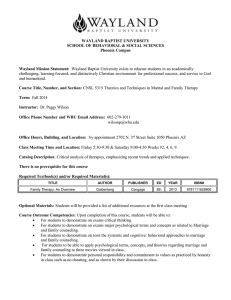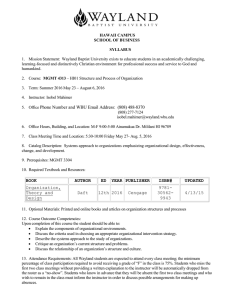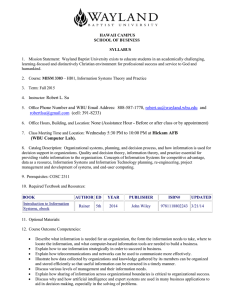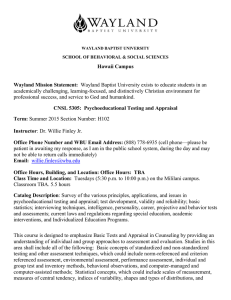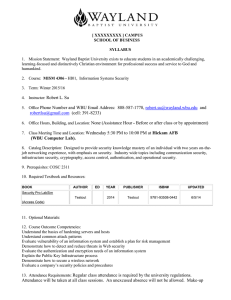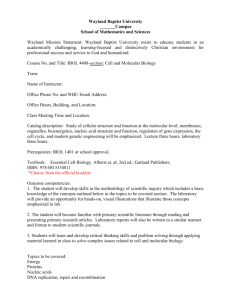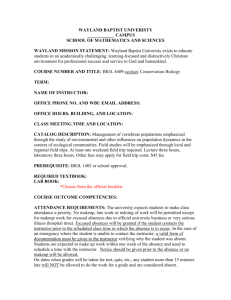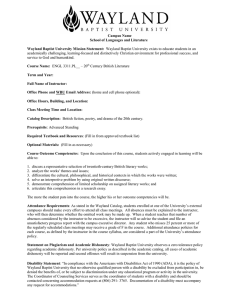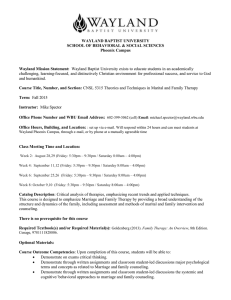WAYLAND BAPTIST UNIVERSITY SCHOOL OF BEHAVIORAL & SOCIAL SCIENCES Fairbanks Campus
advertisement
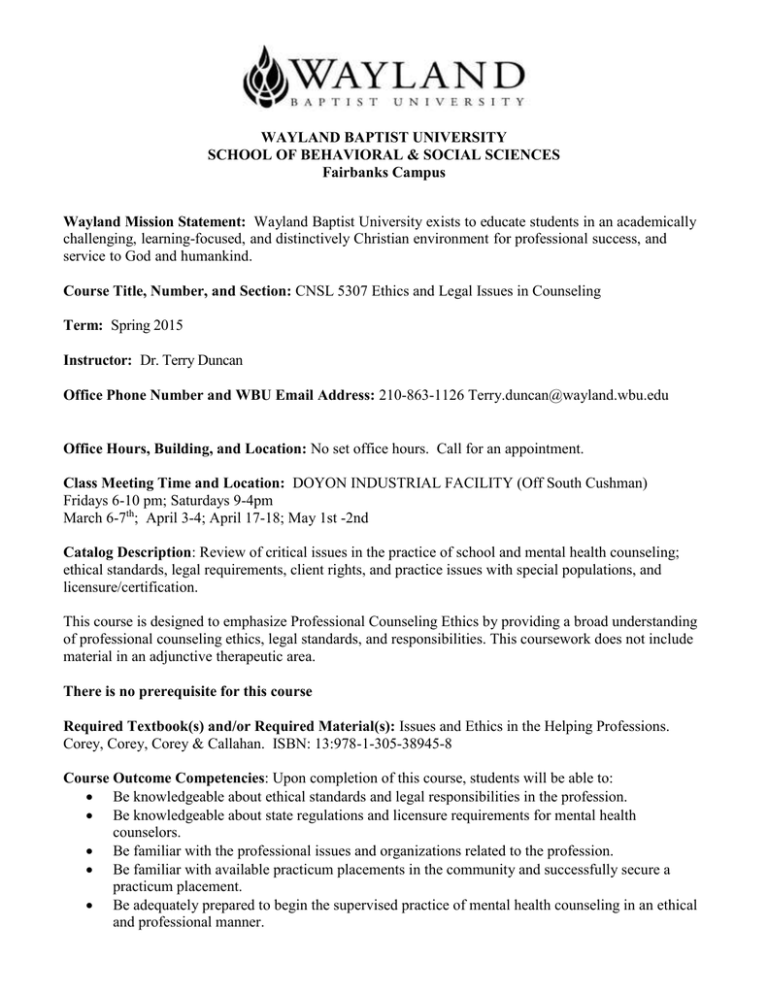
WAYLAND BAPTIST UNIVERSITY SCHOOL OF BEHAVIORAL & SOCIAL SCIENCES Fairbanks Campus Wayland Mission Statement: Wayland Baptist University exists to educate students in an academically challenging, learning-focused, and distinctively Christian environment for professional success, and service to God and humankind. Course Title, Number, and Section: CNSL 5307 Ethics and Legal Issues in Counseling Term: Spring 2015 Instructor: Dr. Terry Duncan Office Phone Number and WBU Email Address: 210-863-1126 Terry.duncan@wayland.wbu.edu Office Hours, Building, and Location: No set office hours. Call for an appointment. Class Meeting Time and Location: DOYON INDUSTRIAL FACILITY (Off South Cushman) Fridays 6-10 pm; Saturdays 9-4pm March 6-7th; April 3-4; April 17-18; May 1st -2nd Catalog Description: Review of critical issues in the practice of school and mental health counseling; ethical standards, legal requirements, client rights, and practice issues with special populations, and licensure/certification. This course is designed to emphasize Professional Counseling Ethics by providing a broad understanding of professional counseling ethics, legal standards, and responsibilities. This coursework does not include material in an adjunctive therapeutic area. There is no prerequisite for this course Required Textbook(s) and/or Required Material(s): Issues and Ethics in the Helping Professions. Corey, Corey, Corey & Callahan. ISBN: 13:978-1-305-38945-8 Course Outcome Competencies: Upon completion of this course, students will be able to: Be knowledgeable about ethical standards and legal responsibilities in the profession. Be knowledgeable about state regulations and licensure requirements for mental health counselors. Be familiar with the professional issues and organizations related to the profession. Be familiar with available practicum placements in the community and successfully secure a practicum placement. Be adequately prepared to begin the supervised practice of mental health counseling in an ethical and professional manner. Attendance Requirements: Fairbanks, Alaska External Campuses Students enrolled at one of the university’s external campuses should make every effort to attend all class meetings. All absences must be explained to the instructor, who will then determine whether the omitted work may be made up. When a student reaches that number of absences considered by the instructor to be excessive, the instructor will so advise the student and file an unsatisfactory progress report with the external campus executive director/dean. Any student who misses 25 percent or more of the regularly scheduled class meetings may receive a grade of F in the course. Additional attendance policies for each course, as defined by the instructor in the course syllabus, are considered a part of the university’s attendance policy. A student may petition the Academic Council for exceptions to the above stated policies by filing a written request for an appeal to the executive vice president/provost. Statement on Plagiarism and Academic Dishonesty: Wayland Baptist University observes a zero tolerance policy regarding academic dishonesty. Per university policy as described in the academic catalog, all cases of academic dishonesty will be reported and second offenses will result in suspension from the university. Disability Statement: In compliance with the Americans with Disabilities Act of 1990 (ADA), it is the policy of Wayland Baptist University that no otherwise qualified person with a disability be excluded from participation in, be denied the benefits of, or be subject to discrimination under any educational program or activity in the university. The Coordinator of Counseling Services serves as the coordinator of students with a disability and should be contacted concerning accommodation requests at (806) 2913765. Documentation of a disability must accompany any request for accommodations. Course Requirements and Grading Criteria: The University has a standard grade scale: A = 90-100, B = 80-89, C = 70-79, D = 60-69, F= below 60, W = Withdrawal, WP = withdrew passing, WF = withdrew failing, I = incomplete. An incomplete may be given within the last two weeks of a long term or within the last two days of a microterm to a student who is passing, but has not completed a term paper, examination, or other required work for reasons beyond the student’s control. A grade of “incomplete” is changed if the work required is completed prior to the last day of the next long (10 to 15 weeks) term, unless the instructor designates an earlier date for completion. If the work is not completed by the appropriate date, the I is converted to an F. Student grade appeals: Students shall have protection through orderly procedures against prejudices or capricious academic evaluation. A student who believes that he or she has not been held to realistic academic standards, just evaluation procedures, or appropriate grading, may appeal the final grade given in the course by using the student grade appeal process described in the Academic Catalog. Appeals may not be made for advanced placement examinations or course bypass examinations. Appeals limited to the final course grade, which may be upheld, raised, or lowered at any stage of the appeal process. Any recommendation to lower a course grade must be submitted through the Executive Vice President/Provost to the Faculty Assembly Grade Appeals Committee for review and approval. The Faculty Assembly Grade Appeals Committee may instruct that the course grade be upheld, raised, or lowered to a more proper evaluation. Tentative Schedule: Weekend I: Chapter 1-4 Weekend II: Chapter 5-7 Weekend III: Chapter 810 Weekend IV: 11-13 Write a one page double spaced; 12 font; Times New Roman page on each chapter about what you learned from the chapter. This is not a summary of the chapter. It is your perspective. What questions did it raise for you? What beliefs, if any, did it challenge? You will write one paper on an ethical issue. It can be a court case; an ethics violation. You can research the pros and cons of an ethical dilemma in counseling. Talk to me about your topic before starting the paper. The paper will be between 7-10 pages. You will need references. APA format. Please make sure your grammar is correct.
